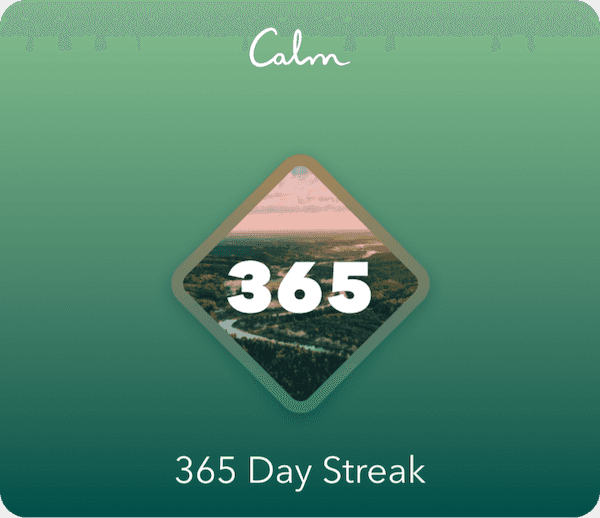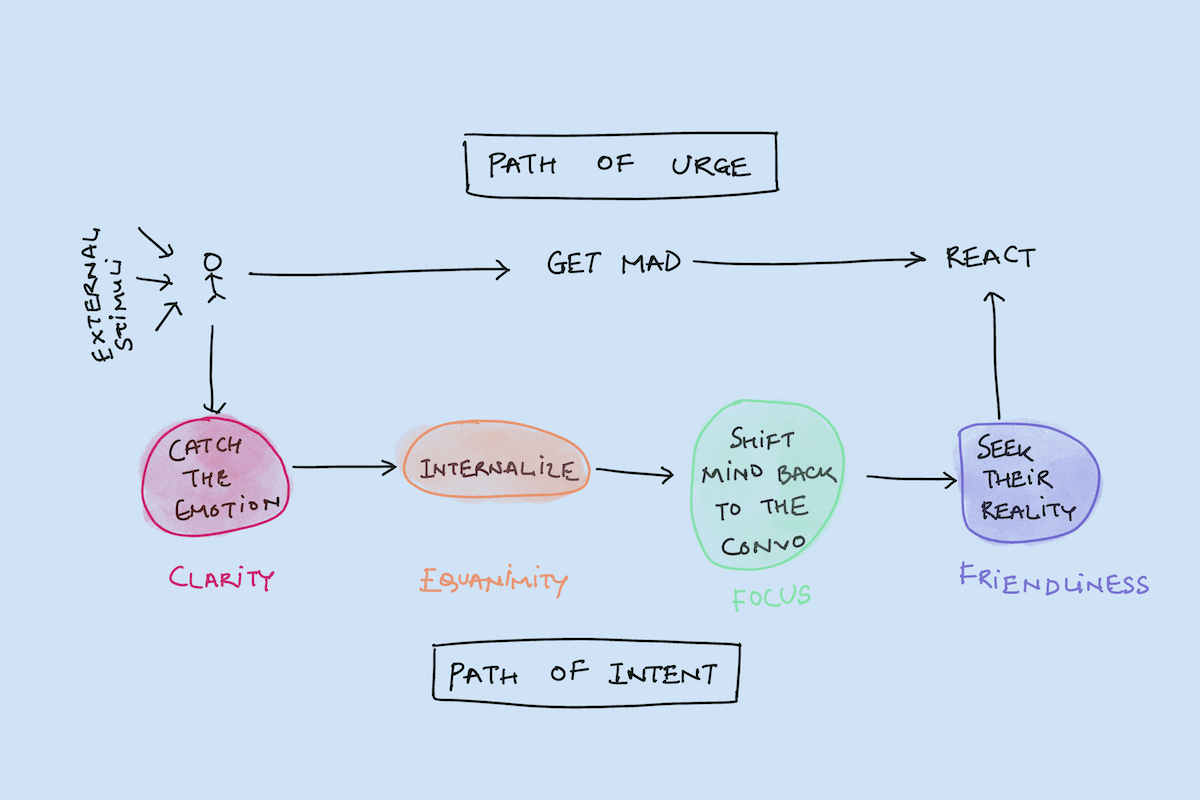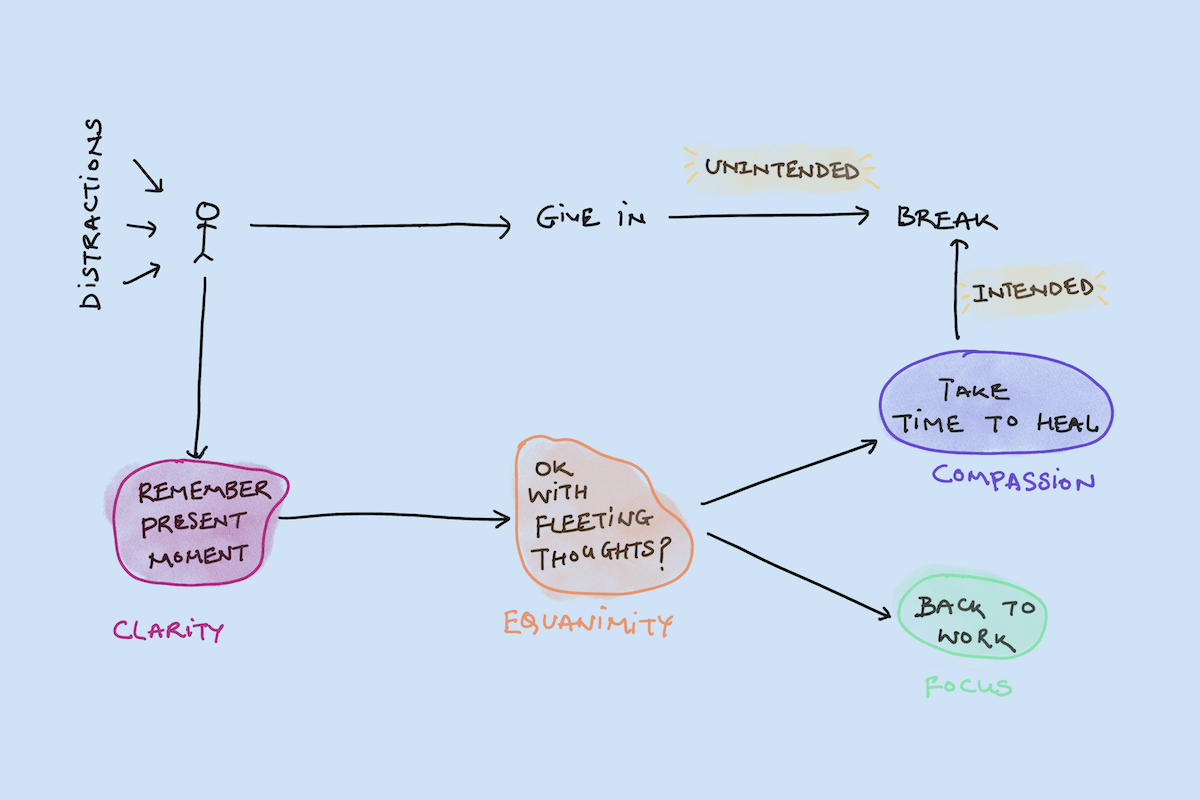A Year of Meditating
May 24, 2022
A close friend introduced me to mindfulness and meditation practice a few years ago. Being ignorant, I brushed it off as an excruciating activity for the elderly.
Today, as I complete a year-long streak of practicing meditation daily, I want to share my journey and the impact it has had on my mental wellbeing.

But, first things first...
What is mindfulness?
Mindfulness is the quality of being in the present - aware of your surroundings and senses and accepting them without any judgment.
Meditation is one of the practices to train awareness and attention and develop mindfulness.
How It Started
A few years ago, my dear friend Shekhar told me he had picked up meditation. I laughed it off, "how friggin old are you"!
Cut to 2020, a few months into COVID. I came close to burning out — I had too much work on my plate, and the thought of getting canned crossed my mind several times when I heard of company reorg. I also had plans to start my own company sometime soon. And the endless worries of everyday life.
It seemed like a good time to start meditation. So I decided to give it a shot finally. Excited to try something new, I downloaded the Calm app and signed up for the trial. Surely enough, I was super committed during the trial phase and felt ready to take the plunge with the paid plan.
Barely a week into it the annual subscription, I stopped!
I must admit, I was borderline ashamed of telling my friend that I had given up in barely a couple of weeks. When Shekhar learned about it, he was surprisingly calm. I'd update him in each of our following calls, "no meditation still"! He would respond, "don't beat yourself up. You will start when you're ready"! His lack of judgment (or motivation) was quite baffling.
A few months later, I decided to give it another chance. There was no trigger, except maybe "I felt I was ready!"
This time I approached meditation like a fitness workout, which I initially struggled with as well! I realized that the inertia to working out is getting dressed. Yeah, that's right! If I were to put on my training clothes and shoes, showing up at the fitness center and working out would be a cakewalk.
So I decided to - sit for 10 mins each day for a week. A week turned into a month, and now a year!
Developing Mental Muscles
Meditation is just like hammer curls for the mind. This mental workout builds four mental muscle groups:
1. Focus
Giving undivided attention to a single task.
2. Clarity
Awareness of everything around you - sounds, sensations, thoughts.
3. Equanimity
Acceptance of everything around you - sounds, sensations, thoughts, and emotions.
4. Friendliness
Being compassionate towards yourself and everyone around you.
Meditation engages these muscle groups, and the practice merges with reality over time. After several months, I deciphered Shekhar's reaction to my non-commitment to meditation, "don't beat yourself up. You will start when you're ready". Let's break it down:
My knowledge of the problem (not meditating) - clarity
"Don't beat yourself" - friendliness (practicing self-compassion)
His lack of judgment on me not meditating - friendliness
"You'll start when you're ready" - equanimity (being okay with the situation)
Overcoming Inertia
Some common criticism I've heard about meditation from folks who've not tried meditation or quit within a few days.
It is not for me.
People have a preconceived notion about meditation. They assume you have to be a certain way, be in a zone, or not think about anything.
Not true.
You can meditate while walking or sitting in a room, with eyes open or closed, while sitting or lying on the bed, not thinking about anything or visualizing a memory - all of it is just okay. The best part? No special setup required, "your home is in your head!"
I don't have stress.
You don't start working out when you injure yourself. You work out to stay fit.
Meditation helps you deal with stress, sure. But that doesn't have to be the starting point. The practice enables you to build mental resilience. Mental toughness is defined by a series of events you do every day, not by distinct (stressful) events in life.
I'm not good at it.
No one is. It's a practice for life.
When you workout, not all workouts are going to be great. There will be days when you feel out of it. But you still continue the activity because you know the results will show in the long run. Mental workouts are no different.
By definition, the mindfulness practice approaches this differently:
The moment you realize you've strayed from the practice is clarity of thought.
When you remember, you return to it. Over time, you get better at this, and that helps you build the muscle of concentration (focus)
Thoughts can remain in the background. Labeling them as "thoughts" helps you step out instead of getting lost in them. That's equanimity.
Lastly, don't judge yourself ("I'm not good at it"). Self compassion --> friendliness
It doesn't work
Most people try and quit the practice in a few days.
Why? Because they're looking in the wrong place. To see if meditation works, you don't see the 10mins, but you look at your life outside it. The practice impacts the way you approach things in your daily life. The more you do, the better you get. And the practice merges with the world.
Let's dig deeper into this...
Does It Work?
How do you know that meditation is working? It's not during the meditation, but your life outside of meditation is the place to look at. Are you more relaxed? Are you more available? Like fitness... it's a slow process, but one that works.
Just like your friends or close ones are first to comment when you lose weight, the people around you take notice as you react to situations in daily life.
My wife was the first to mention the change in my behavior compared to a few months ago. It prompted me to dig deeper into my thought process.
Here's the REAL impact of meditation on my daily life.
Handling Disagreement
Where I would typically be quick to reply, I listen.
We're wired to think negatively when the situation doesn't match expectations. When these situations involve other people, it urges us to react. The difference between controlling the urge vs. reacting to it is merely a few milliseconds. Practicing meditation over time, the muscle of clarity grows stronger, and the ability to catch the urge to react improves to assist you in choosing an appropriate reaction.
Breakdown
Catch the thought --> muscle activated: clarity
Internalize the feeling --> muscle activated: equanimity
Get back in the conversation --> muscle activated: focus
Ask questions to understand their point of view --> muscle activated: friendliness
Short term effect: peaceful mind
Long term effect: better relationships

Higher output
In a world where we're constantly distracted by notifications, the practice has helped me focus on work healthily (positive net output).
Through home base practices, you learn to focus on a sensation (breath, touch, sounds). For someone like me, I had a tough time with it. I would often drift away into my to-do list. The core idea here is to return when you remember without self-judgment ("I can't do it"!) As you practice, the ability to stay with your home base increases.
This superpower is transferrable to everything you do though the day.
Breakdown
Remember the current moment --> muscle activated: clarity
Being okay with the fleeting thought --> muscle activated: equanimity
Compassionate to self for drifting away --> muscle activated: friendliness
Returning to work --> muscle activated: focus
Short term effect: do more work
Long term effect: build habits easily
Be happier
Suffering comes from trying to control and micromanage your experiences.
Every now and then, my past incidents and future worries start to consume me. This isn't very different from getting distracted by notifications. Instead of fighting the emotions, I try to think of them as a part of "me" and try to accept them. Accepting our feelings means being with them without being lost in them. Sometimes telling yourself, "Aal is Well" is enough to return to the present moment. In other cases, it's essential to indulge in self-care, taking short breaks, going out for a walk, playing a sport, or taking longer breaks to go out on vacation.
Breakdown
Recognize the feeling/emotion --> muscle activated: clarity
Welcome the feeling and understand it --> muscle activated: friendliness
Returning to present activity --> muscle activated: focus
Short term effect: peaceful mind, more breaks
Long term effect: be happier

Resources to start
Getting started with meditation is pretty easy - you don't need any special attire, or a special setup.
There are plenty apps and Youtube videos to get started. I would strongly recommend starting with short guided practices.
Personally, I started with How to Meditate, a 30 day guided meditation course by Jeff Warren on the Calm app. Jeff takes you through a variety of different mediations; each session lasting 5-10 minutes. It equips you to choose a meditation that works best for you at the end of the course.
After the course, I've stuck with the Daily Calm sessions by Jeff Warren, which range from 5-10mins, and a new one every day.
Furthermore, I've experimented with sleep meditation and basic breath-work exercises. Sleep meditations have been incredibly helpful to induce sleep when my brain is running 100mph. Breathwork, as the name suggests, are breath exercises that can help you play around with your energy levels. I often use them to calm my nerves before an important meeting, pump myself up on a long tiring day, or relaxing myself into a nap. It works like a charm.
Final Takeaway
Mindfulness has the potential to change the world.
It may not seem like it at first, it's a passive act of 'just sitting and being' after all. But, it's infectious. People meditate, their loved ones learn about it - directly or through their (calmer) actions. And just like that it turns into an active movement of spreading love and kindness.
The world needs more of it!
I wanted to do my bit of spreading mindfulness and decided to gift Calm's month-long subscription who might be looking to get into it. Details 👇